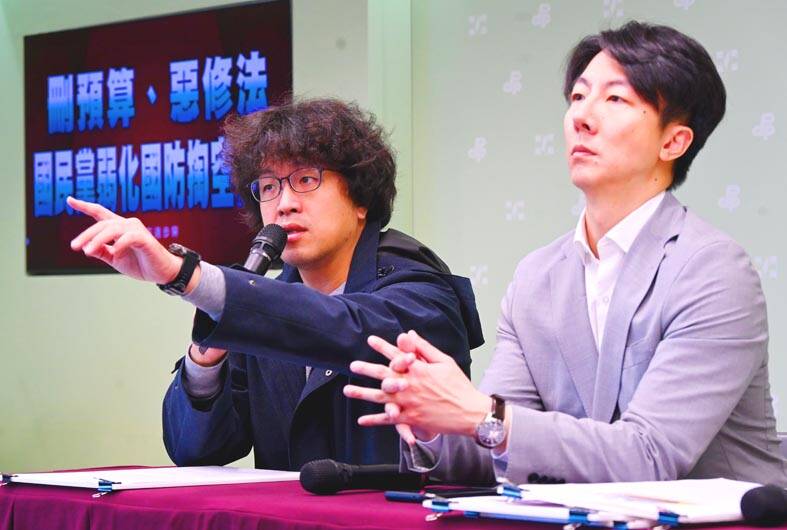Lawmakers from the Democratic Progressive Party (DPP) have accused their counterparts from the Chinese Nationalist Party (KMT) of weakening national security, following proposed budget cuts to the submarine program and draft amendments to the Civil Defense Act (民防法).
DPP spokesman Justin Wu (吳崢) and legislators Michelle Lin (林楚茵) and Puma Shen (沈伯洋) held a news conference yesterday to discuss concerns about the proposals that they said could undermine national security goals.
Taiwan’s defense has serious challenges, Wu said, adding that KMT legislators Ma Wen-chun (馬文君), Huang Jen (黃仁) and Hsu Chiao-hsin (徐巧芯) blocked funding for construction of domestic submarines.

Photo: Liu Hsin-de, Taipei Times
The total submarine budget for the next 14 years is NT$28.4 billion (US$873 million), with the budget for next year set at NT$1.9 billion.
However, Hsu proposed a budget cut of NT$1.7 billion for next year, leaving just NT$200 million, while Ma and Huang proposed cutting the budget entirely.
China’s military activities near Taiwan’s airspace have increased in frequency, but the KMT has not allowed for Taiwan to strengthen its defensive capabilities since the Chen Shui-bian administration (陳水扁), Wu said.
During the administration of former president Tsai Ing-wen (蔡英文), the government prioritized domestic submarine construction, but the KMT has repeatedly blocked those plans through budget freezes and proposed cuts, he said.
National defense requires unity, just as Taiwanese showed unity when cheering for “Team Taiwan” — the national baseball team who won the World Baseball Softball Confederation’s Premier12 championship in Tokyo this weekend, Lin said.
Comparing the budget for next year to a deposit on purchasing a home, Lin said that if the proposed budget cuts go through, it would announce to the world that Taiwan is abandoning its submarine program.
That behavior only benefits the Chinese Communist Party (CCP), she said, adding that the KMT should consider whether it wants to be the CPP’s “local collaborator” or support Taiwan instead.
Shen compared Taiwan’s national defense to winning a baseball championship — the frontline armed forces, the civil defense systems, and the people’s self-defense determination must all come together to achieve success.
By cutting the submarine budget and amending the Civil Defense Act and All-out Defense Mobilization Readiness Act (全民防衛動員準備法), the KMT undermines Taiwan’s frontline defense systems, reduces its logistical support and weakens the ability for citizens to participate in its defense, Shen said.
Recent actions by the KMT, including the proposed changes to the Constitutional Court and Officials Election and Recall Act (公職人員選舉罷免法), “hollow out” the country, Shen added.

DEFENSE: The National Security Bureau promised to expand communication and intelligence cooperation with global partners and enhance its strategic analytical skills China has not only increased military exercises and “gray zone” tactics against Taiwan this year, but also continues to recruit military personnel for espionage, the National Security Bureau (NSB) said yesterday in a report to the Legislative Yuan. The bureau submitted the report ahead of NSB Director-General Tsai Ming-yen’s (蔡明彥) appearance before the Foreign and National Defense Committee today. Last year, the Chinese People’s Liberation Army (PLA) conducted “Joint Sword-2024A and B” military exercises targeting Taiwan and carried out 40 combat readiness patrols, the bureau said. In addition, Chinese military aircraft entered Taiwan’s airspace 3,070 times last year, up about

A magnitude 4.3 earthquake struck eastern Taiwan's Hualien County at 8:31am today, according to the Central Weather Administration (CWA). The epicenter of the temblor was located in Hualien County, about 70.3 kilometers south southwest of Hualien County Hall, at a depth of 23.2km, according to the administration. There were no immediate reports of damage resulting from the quake. The earthquake's intensity, which gauges the actual effect of a temblor, was highest in Taitung County, where it measured 3 on Taiwan's 7-tier intensity scale. The quake also measured an intensity of 2 in Hualien and Nantou counties, the CWA said.

The Overseas Community Affairs Council (OCAC) yesterday announced a fundraising campaign to support survivors of the magnitude 7.7 earthquake that struck Myanmar on March 28, with two prayer events scheduled in Taipei and Taichung later this week. “While initial rescue operations have concluded [in Myanmar], many survivors are now facing increasingly difficult living conditions,” OCAC Minister Hsu Chia-ching (徐佳青) told a news conference in Taipei. The fundraising campaign, which runs through May 31, is focused on supporting the reconstruction of damaged overseas compatriot schools, assisting students from Myanmar in Taiwan, and providing essential items, such as drinking water, food and medical supplies,

New Party Deputy Secretary-General You Chih-pin (游智彬) this morning went to the National Immigration Agency (NIA) to “turn himself in” after being notified that he had failed to provide proof of having renounced his Chinese household registration. He was one of more than 10,000 naturalized Taiwanese citizens from China who were informed by the NIA that their Taiwanese citizenship might be revoked if they fail to provide the proof in three months, people familiar with the matter said. You said he has proof that he had renounced his Chinese household registration and demanded the NIA provide proof that he still had Chinese